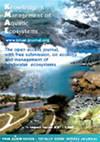恢复城市池塘生态系统水生生物群落的生态工程方法及其对水质的影响——以中国城市西溪国家湿地公园为例
IF 1.7
3区 环境科学与生态学
Q3 FISHERIES
引用次数: 2
摘要
全球城市化进程加快,导致城市湿地和池塘生境的丧失和破碎化。城市池塘在城市生态中具有重要作用,因为它们为水生物种提供了必要的栖息地。本研究的目的是展示在城市池塘生态系统中恢复水生生物群落的生态工程方法,这可以用于实现全球此类生态系统的水净化。设计并实施了首先清理池塘,然后系统地对植物和鱼类进行不同处理的一般方法。我们在每个工程处理中使用三个重复的池塘,根据水质和生物指标的评估来确定哪种处理是最佳选择。本研究的主要发现是:水生动物和水生植物的组合可以提供最佳的水净化性能;此外,纯化贝拉米(Bellamya purificata)等大型底栖动物可作为当地城市池塘生态系统优势种和水质监测的生物指示种。综上所述,维持不同营养水平的生物物种多样性可以为城市池塘生态系统提供最佳的净水性能。本文章由计算机程序翻译,如有差异,请以英文原文为准。
Ecological engineering approaches to restoring the aquatic biological community of an urban pond ecosystem and its effects on water quality ‑ a case study of the urban Xixi National Wetland Park in China
There is a global increase in urbanization, which contributes to the loss and fragmentation of urban wetland and pond habitats. Urban ponds have an important role in the ecology of urban areas, as they provide essential habitats for aquatic species. The objective of this study is to demonstrate ecological engineering approaches to restoring aquatic biological communities in an urban pond ecosystem, which can be used to achieve water purification of such ecosystems globally. The general approach of first cleaning out the ponds and then systematically applying different treatments of plants and fish was designed and implemented in the field. We used three replicated ponds per engineering treatment to determine which of the treatments was the best option based on an assessment of water quality and biological indicators. The main findings of this study were as follows: a combination of aquatic animals and aquatic plants can provide the best water purification performance; furthermore, macrobenthos, such as Bellamya purificata, can be used as biological indicator species for monitoring dominant species and water quality in a local urban pond ecosystem. In conclusion, maintaining biological species diversity over different trophic levels can provide the best water purification performance in urban pond ecosystems.
求助全文
通过发布文献求助,成功后即可免费获取论文全文。
去求助
来源期刊

Knowledge and Management of Aquatic Ecosystems
环境科学-海洋与淡水生物学
CiteScore
3.70
自引率
5.60%
发文量
22
审稿时长
>12 weeks
期刊介绍:
Knowledge and Management of Aquatic Ecosystems (KMAE-Bulletin Français de la Pêche et de la Pisciculture since 1928) serves as a foundation for scientific advice across the broad spectrum of management and conservation issues related to freshwater ecosystems.
The journal publishes articles, short communications, reviews, comments and replies that contribute to a scientific understanding of freshwater ecosystems and the impact of human activities upon these systems. Its scope includes economic, social, and public administration studies, in so far as they are directly concerned with the management of freshwater ecosystems (e.g. European Water Framework Directive, USA Clean Water Act, Canadian Water Quality Guidelines, …) and prove of general interest to freshwater specialists. Papers on insular freshwater ecosystems and on transitional waters are welcome. KMAE is not a preferred journal for taxonomical, physiological, biological, toxicological studies, unless a clear link to ecological aspects can be established. Articles with a very descriptive content can be accepted if they are part of a broader ecological context.
 求助内容:
求助内容: 应助结果提醒方式:
应助结果提醒方式:


